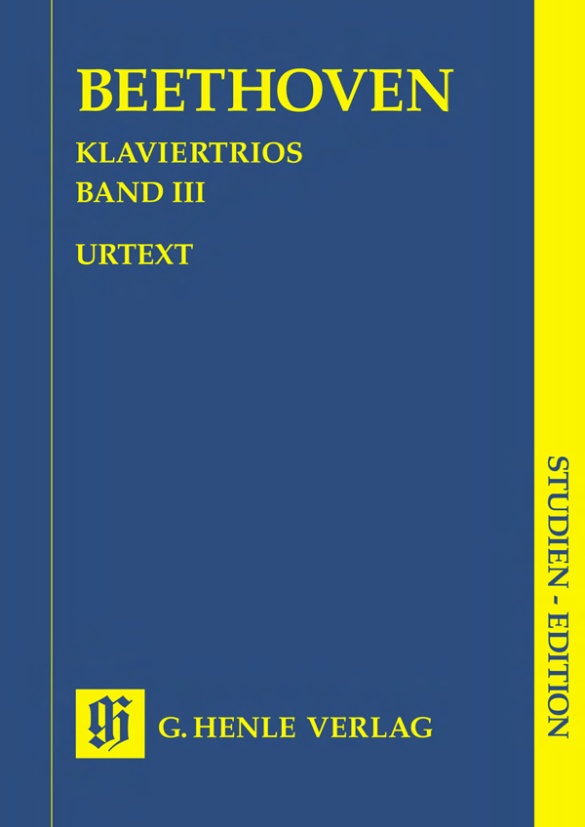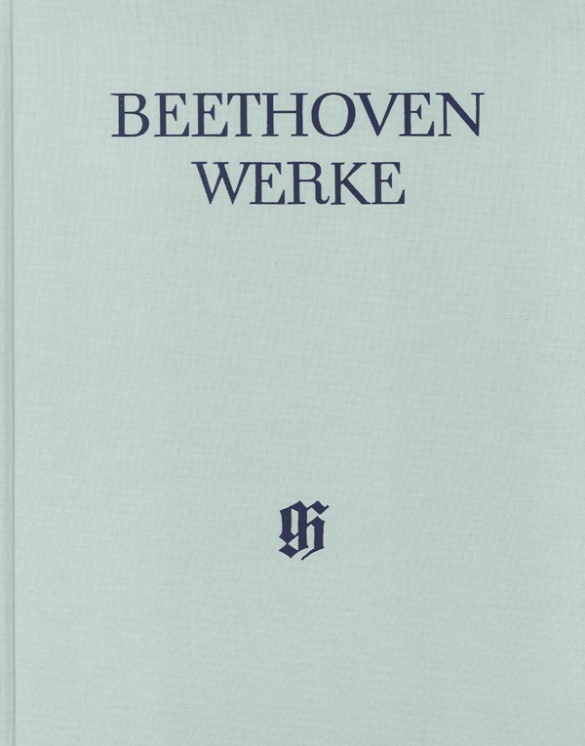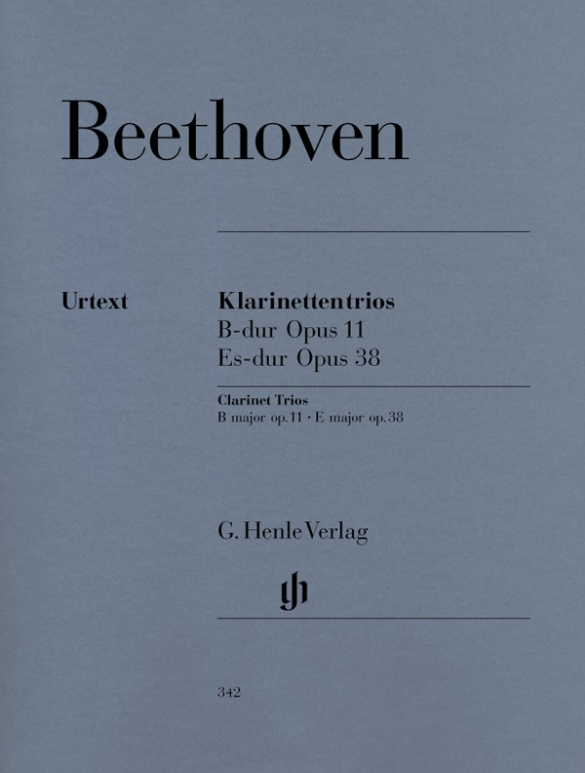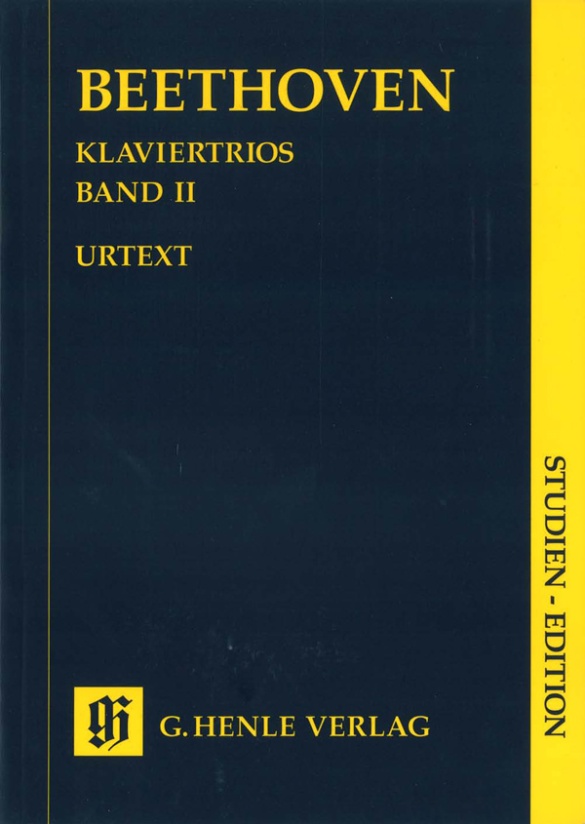

Ludwig van Beethoven
Piano Trios, Volume II
In the classical era, and far into the 19th century, piano trios were what we might call “fashion accessories”. It is thus no coincidence that Beethoven, following in the footsteps of Haydn and Mozart, took up this genre and created altogether 13 piano trios of his own.
This second volume contains the two Piano Trios op. 70 and the Trio op. 97, as well as the Variations on the song “Ich bin der Schneider Kakadu” op. 121a. The nickname “Geistertrio” (Ghost Trio) of the Trio op. 70 no. 1 stems, as usual, not from Beethoven but was given to the piece no doubt because of the spooky, mysterious sound of the slow movement.
The Archduke Trio op. 97 was named after its dedicatee Archduke Rudolph and is undisputedly Beethoven’s most important composition of this kind. With a duration of over 45 minutes, it is also his longest piano trio. Though written in 1810/11, it was not published until 1816.
Content/Details
About the Composer
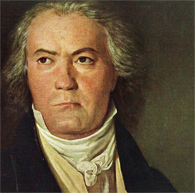
Ludwig van Beethoven
No composer has had as profound and sustained an influence on immediately following generations to the present day as Beethoven. His instrumental music, especially his symphonies, served as touchstones for symphonic composition throughout the nineteenth century. The extraordinarily high standard of his music and his relative independence as a freelance composer have led to his being characterized as the greatest composer of all time.
| 1770 | Baptized in Bonn on December 17, thus probably born on December 16, the son of Johann van Beethoven, a tenor in the court chapel of the prince-elector. First musical instruction from his father. |
| 1778 | First public performance. |
| around 1780 | Musical training with the deputy court organist Christian Gottlob Neefe, who in 1783 presented him in Cramer’s “Magazin der Musik” as a second Mozart. |
| 1782 | Acquaintance with the Breuning family, where his literary interest is aroused. First publication: Piano Variations in C minor on a March by Dressler, WoO 63. |
| 1783 | Harpsichordist in the court chapel; 1784 assistant to the court organist. |
| 1787 | Journey to Vienna. Here he very likely meets Mozart, who probably gives him some lessons. After a short while he must return home to his mother, who is ill with tuberculosis. |
| 1792 | He travels a second time to Vienna, where he will remain until the end of his life. Count von Waldstein sends him on his way with the famous words: “With steady diligence you will receive Mozart’s spirit from Haydn's hands.” In Vienna he studies with Haydn, Albrechtsberger, Schuppanzigh, and Salieri. As a pupil of Joseph Haydn, he achieves extraordinary recognition among the Viennese nobility and receives financial support. Great demand for his compositions from publishing houses: chamber music and piano sonatas from the Bonn and early Viennese years are issued. His first works printed in Vienna (among them the piano sonatas, Op. 2) already bear the hallmark of his compositional style: a forward-advancing, spirited, process-related character. |
| 1796 | Concert tours to Prague, Berlin, Leipzig, and Dresden, which cement his fame. |
| 1798 | Piano Sonata in C Minor, “Pathétique,” Op. 13. |
| 1798–1800 | String quartets, Op. 18. |
| 1799/1800 | Symphony No. 1 in C major, Op. 21 |
| 1795/1800 | Piano Concerto No. 1 in C major, Op. 15 |
| 1800–01 | Piano sonatas, Op. 27, “quasi una fantasia,” including the Moonlight Sonata, Op. 27 No. 2. |
| 1801 | Composition of the Symphony No. 2 in D major, Op. 36 (until 1802). Publication of the Piano Concerto No. 2 in B-flat major, Op. 19. |
| 1801/02 | Crisis brought on by incipient hearing loss, documented in the “Heiligenstadt Testament.” Thereafter he begins, by his own admission, a “New Path” in his compositions, reflected particularly in the piano sonatas, Op. 31 (including the Tempest Sonata); the piano variations, Op. 34 and 35; and the Symphony No. 3 in E-flat major, “Eroica,” Op. 55: they are characterized by enhanced structural development as well as by the use of Baroque techniques and models from other genres. |
| 1803–10/12 | Frenzy of creativity; these years are dubbed Beethoven’s “heroic period”. Written during this phase are Symphonies Nos. 3 through 8 (Opp. 55, 60, 67, 68, 92, 93); Piano Concerti Nos. 3 through 5 (Opp. 37, 58, 73); the Violin Concerto in D major, Op. 61; the Triple Concerto, Op. 56; string quartets (the Razumovsky quartets, Op. 59; the Harp Quartet in E-flat major, Op. 74; the String Quartet in F minor, “serioso,” Op. 95); piano trios (among them the “Ghost” Trio, Op. 70); piano sonatas (including the Waldstein Sonata in C major, Op. 53; the Appassionata in F minor, Op. 57; and “Les Adieux” in E-flat major, Op. 81a); songs (including “An die Hoffnung,” Op. 32); the Mass in C major (Op. 86); and the opera “Fidelio” (Op. 72, first version 1804/5). |
| 1808/09 | Beethoven rejects an offer to become the First Kapellmeister at the court in Kassel because his patrons, Archduke Rudolph, Prince Kinsky, and Prince Lobkowitz, provide him with a comparable yearly salary. |
| 1811/12 | Travels to the spa at Teplitz, where he meets Goethe. In 1812, the letter to the “immortal beloved,” whose identity (Antonie Brentano or Josephine Deym) is still uncertain. |
| 1814 | Piano Sonata in E minor, Op. 90; third version of the opera “Fidelio.” Extraordinarily successful concert with Symphonies Nos. 7 and 8. Still, financial crisis brought about by currency devaluation and the absence of yearly stipends from Kinsky and Lobkowitz. |
| 1815 | Death of his brother Caspar Carl and the beginning of the years-long battle for the guardianship of his nephew Karl. |
| 1816 | Song cycle “An die ferne Geliebte,” Op. 98; Piano Sonata in A major, Op. 101. |
| 1817–18 | Hammerklavier Sonata in B-flat major, Op. 106. |
| 1818 | Beethoven begins keeping conversation books due to increasing hearing loss. |
| 1819–23 | Missa solemnis, Op. 123. |
| 1819/23 | Diabelli Variations, Op. 120. |
| 1820 | Piano Sonata in E major, Op. 109, marks the beginning of his glorious late period, which is characterized by exceeding the boundaries of forms, by extreme pitch registers, advanced harmonies, and an increased penchant for contrapuntal forms such as fugue; standing in opposition to the propensity for esotericism in his chamber music is the monumentality of Symphony No. 9. |
| 1821/22 | Piano Sonatas in A-flat major, Op. 110 (with fugue in the final movement), and C minor, Op. 111 (reduction to two movements). |
| 1822–26 | String quartets, Opp. 127, 130, 131, 132, 135, as well as the Grosse Fuge, Op. 133, which originally formed the final movement of Op. 130. |
| 1823/24 | Completion of the Symphony No. 9 in D minor, Op. 125, which for the first time in the history of the genre includes voice parts (Schiller’s “Ode to Joy”). It will become the most famous and most frequently played symphony of all time. |
| 1827 | Death in Vienna on March 26. |
About the Authors
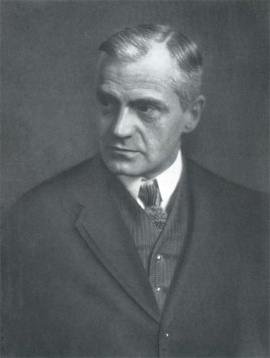
Walther Lampe (Fingering Piano)
Prof. Walther Lampe, born in 1872 in Leipzig, died in 1964 in Munich, studied the piano with Clara Schumann at the Hoch’schen Konservatorium in Frankfurt, as well as music theory and composition. He concluded his studies in Berlin, where he was a student of Herzogenberg and Humperdinck.
He first appeared as a concert pianist, but in 1920 was appointed as a professor and head of a class at the Münchener Akademie der Tonkunst. After Lampe was given emeritus status in 1937, he took on a piano class at the Mozarteum in Salzburg. Günter Henle, who grew up in Munich, was a private pupil of Lampe’s, from the age of 15 (in 1914). In his autobiography he wrote of his piano teacher in the following glowing terms:
“The years in which Walther Lampe, the renowned pianist and Head of piano master-classes in Munich and Salzburg, instructed me in the higher mysteries of piano playing, are amongst the most treasured memories of my youth. […] Lampe, himself an excellent concert pianist, had the reputation of being one of the leading teachers. Due to his practical experience of many decades he was able to pass on his great knowledge and skill both in words and through his own playing in a highly inspiring and supportive manner. His interpretations of Mozart were positively divine. […] I remain indebted to him for his great artistic suggestions and his friendship, which he shared with me over decades.”
During the first few years of World War II, Günter Henle looked up his old teacher and friend in Munich several times to play music with him. It was self-evident for Günter Henle to inform Walther Lampe of his plans to set up his music publishing house shortly after the end of the war, asking him for his help and advice. Lampe was very actively involved in the first editions: almost all of the Urtext editions published in the early years were supervised intensively by Lampe, a fact which is attested by the comprehensive correspondence in the archives of G. Henle Publishers. And Lampe also contributed his own fingerings to almost all of these editions. It is a very impressive list of titles, which even today still form part of G. Henle Publishers’ core repertoire.
Product Safety Informations (GPSR)

G. Henle Verlag
Here you can find the information about the manufacturer of the product.G. Henle Verlag e.K.
Forstenrieder Allee 122
81476 München
Germany
info@henle.de
www.henle.com
Die handliche Studien-Ausgabe ermöglicht nicht nur das Mitlesen und Studieren der Trios nach dem Urtext. Da dennoch das Druckbild klar und großzügig ist, könnte der Klavierpart auch anhand der Studienausgabe einstudiert werden. Eine für die wissenschaftliche wie praktische Arbeit gleichermaßen geeignete Ausgabe.
Das Musikinstrumentrecommendations
autogenerated_cross_selling
Further editions of this title


